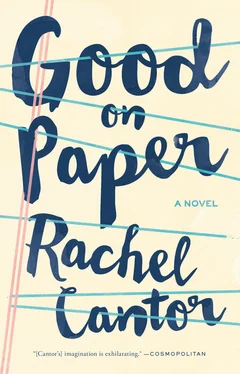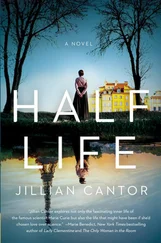Romei, enchanted by his new life, realizes he’s been in hiding, a prisoner still of his grain silo. He liberates clothes from the closets of drunken friends, takes any opportunity to practice his new persona. He watches Esther read and write in the park. Sometimes — a limber man, apparently — he watches her from a tree. Sometimes he comes upon her “by chance,” takes her to the Catacombs, the church of skulls, places where she trembles and must touch his sleeve. Over cappuccino, using half sentences, broken words, she confides a certain unhappiness: her husband is kind but … One doesn’t … He can’t, which is to say he won’t … not really. Her gabbling is captured in an Italian sonnet replete, of course, with weak feminine rhymes.
One day, in front of Masaccio’s Expulsion , in a scene brimming with elevated language, elegant artifice, Romei kisses the back of Esther’s neck. She doesn’t stop him — in fact, she kisses him back. The scene’s artificiality, its nonliterality, is made plain by the fact that the painting in question, a fresco depicting the ejection of Adam and Eve from Eden, is not (in “real life”) in Rome, but attached — firmly, we hope — to the walls of a Florentine chapel.
Esther seeks him out. She waits in Piazza Santa Maria, umbrella in hand, as if they had a date, she calls asking about Italian authors. They meet on weekdays when her husband is away, which is often. When the narrator thinks a man has touched Esther in a tram, he punches him, pulls her out at the next stop, presses her against a building — he can’t stop kissing her face, her neck, her shoulders till poked by a grandma in black: Vergogna! she cries. Shame on you!
Indeed.
Some nights, crazed by the thought of her, the narrator calls, her husband answers, the poet babbles in Romanian, as if that were a disguise . Poem number three, written, appropriately, in twisted terza rima , concerns the language of these calls: three voices, uncomprehending, frantic, hurt, propelled then stalled by rhymes that never quite arrive at their destination.
Then one day in the Vatican, Esther whispers in Romei’s ear: Come to me tonight, I’ll be alone . They stand before Raphael’s Parnassus , the triumph of Poetry, the great ones bearing witness to his victory: Homer, Dante, the muses. Romei is no longer an exile, no longer an isolated poet rejecting tradition. He has slithered his way into the very home of the Pope, he has claimed his place in the confraternity of art. That night, Romei takes Esther by candlelight. Her face is lit by fire, her post-coital languor enflames him to unprecedented acts of virility.
Despite his hyperbole, Romei is reticent about their lovemaking, preferring to dwell on their stratagems and lack of remorse. Art becomes a screen for them both. He’s brought to Esther’s home, is introduced as an expert in the Bible, Hebrew literature — everything he knows exactly nothing about. He’s agreed to help Esther with her translation, she says, not bothering to temper her excitement. Romei acts the fool, tells self-effacing stories, unfunny jokes; he tries to downplay the threat, which must have been as palpable to the husband as the chicken on his plate.
Sonnet number four recounts this dinner conversation.
Later, while washing his back, Esther reminds her husband what she’s given up for him — her studies, her youth, her ambition. She plays on his soft spots: his need to indulge her, to see her as someone who needs indulging. Despite her attention, his “spots” remain soft, described in language that can only be called flaccid. It’s unclear what the husband suspects: they don’t care. Romei tosses stones at her window, misses, shouts apologies to shopkeepers who open their shutters in response, he takes her to restaurants where they might be seen .
The section is honest and peculiar: their passion is plain but there is little evidence of love, certainly not the kind which (I’m told) sustains a couple for forty years. What Esther seems to desire is not Romei so much as escape from marriage: she is stifled, he is free! Romei’s motivation is more complex: he enjoys his new self, it pleases him to see her take risks for him — he has nothing to lose, or so he thinks; also, he likes to see her flush under the pressure of his hand, and when she says, Yes, yes! he begins to feel he’s found a place in this world.
The fifth poem concerns the pleasure the narrator takes in artifice and orifice ( artifizio e orifizio ), and his concern, the perennial concern of the male lover, over his lady’s pleasure: Is it real or is it Memorex?
Charming. This was what Romei wanted to share about his wife? I couldn’t imagine why.
But I was troubled by something else. I went through the pages again — slowly — and counted seven images and ideas familiar from my stories: stone hitting bedroom window, woman helped off a bench, a first kiss to the back of the neck, roast chicken on a plate … They weren’t extraordinary, I held no patent. But still: coincidence?
Disgusted, I stuffed the pages into my folder and reached for last week’s puzzle. There was still the betrayal of the husband to look forward to.
I couldn’t wait.
•
My crossword was a patchy mess when I realized it was time to go home. I looked over at the playground to call Andi.
She wasn’t there.
She wasn’t running in circles, I couldn’t see her on the swings or on a seesaw. I couldn’t see her anywhere.
Andi! I shouted, grabbing my mom-bag, but leaving Romei’s pages, Andi’s shovel and pail on the bench. Andi! I screamed, and ran barefoot from the fountain. Andi! I screamed as I ran around the jungle gym.
And saw there, behind a tree, the edge of a Marimekko dress. And there, by the whirligig, a science girl, face hidden in her hands, counting to one hundred.

I was surprised on returning home to detect the unmistakable scent of an Oh Happy Day Cake. An upside-down macaroon concoction Joe made us on special occasions, as when Ahmad published another book or Andi found a dollar on the street. I guessed that this was yet more camp-graduation nonsense, but resolved to be chipper.
Tradition mandated that the cake be eaten before dinner, because that’s the way God intended it, and served with as many candles as the frosting could support, so that Andi, acting as proxy for the celebrant, could blow them out as a way of sharing the joy. Which she did tonight, in just four tries.
Hooray! we cried, and passed around slices, admiring the cake’s macaroon lightness, its admirable upside-downness. Then Ahmad stood and clinked his glass with a fork.
Friends, Romans, and country girls. I have an announcement.
Announcement? He must have heard from Mirabella. He must be about to tell Andi she has a brother — or rather, a half-brother half of the time.
A pause as he allowed suspense to build. Andi didn’t care: she was eating her cake.
I have decided, he said,… to buy a house!
A house?
You’re kidding! Where? I asked, thinking, let it not be Brooklyn! The Village would be a drag, but Brooklyn — impossible!
Connecticut! he said, and named a town, a hamlet known for its green lawns and polite Republicans. It was on the commuter line, but only barely.
Oh, an investment! I said. I was confused for a minute! Good thinking!
We’ll need a bigger place, he said, and looked at me meaningfully.
Have you …?
He shook his head one degree: he hadn’t heard from Mirabella.
Читать дальше













